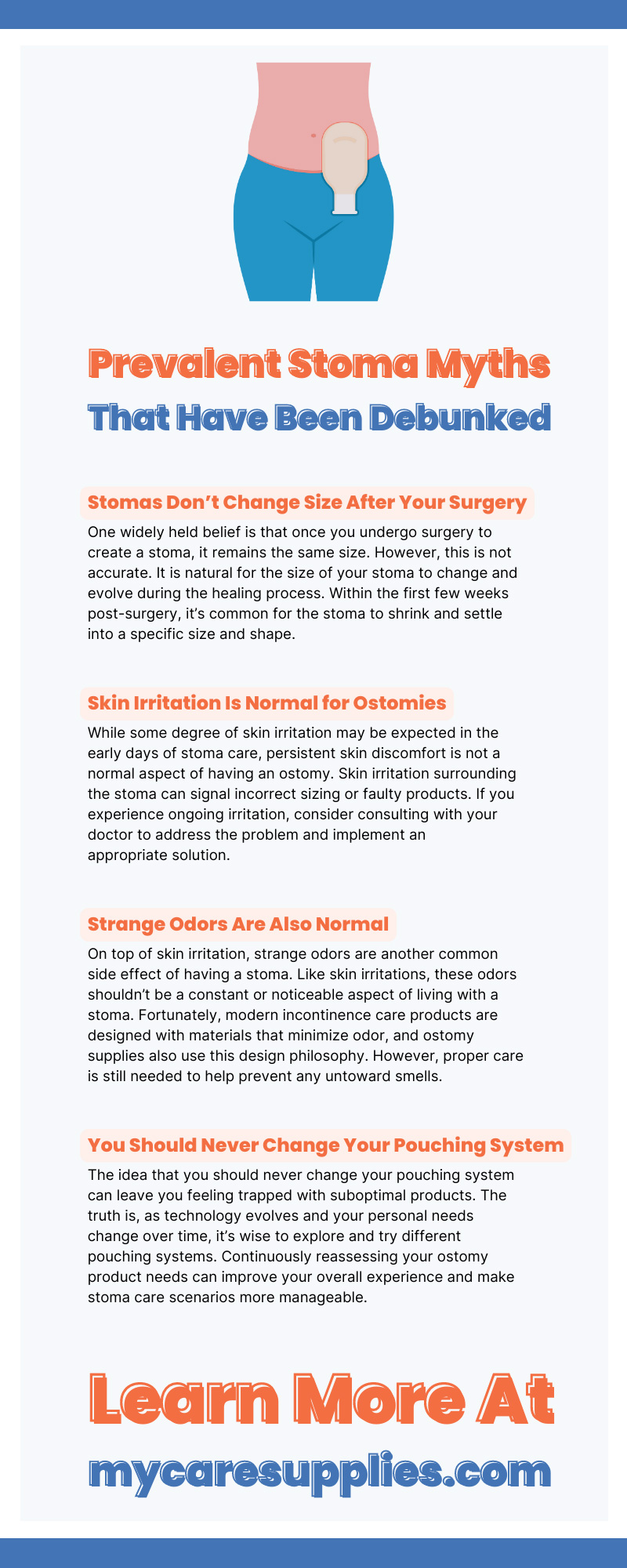Prevalent Stoma Myths That Have Been Debunked
Posted by Jeanne Lowry on Aug 3rd 2023

For most people, the concept of having a stoma might seem like a daunting and life-altering experience. Because of that, if the day comes when you need to have an ostomy surgery, you might be worried about many things that simply aren’t true.
As with any medical condition, misconceptions and myths are bound to exist, but it’s important to spread the truth so people don’t worry as much about these conditions. In this article, we aim to debunk some of these common myths for stomas, dispel misinformation, and provide accurate data to reassure and guide you.
Stomas Don’t Change Size After Your Surgery
One widely held belief is that once you undergo surgery to create a stoma, it remains the same size. However, this is not accurate. It is natural for the size of your stoma to change and evolve during the healing process.
Within the first few weeks post-surgery, it’s common for the stoma to shrink and settle into a specific size and shape. Given this change, it’s crucial to consult with healthcare professionals or stoma nurses to ensure you use the correct pouching system size for optimal comfort and to prevent leaks or skin irritation.
Skin Irritation Is Normal for Ostomies
While some degree of skin irritation may be expected in the early days of stoma care, persistent skin discomfort is not a normal aspect of having an ostomy. Skin irritation surrounding the stoma can signal incorrect sizing or faulty products. If you experience ongoing irritation, consider consulting with your doctor to address the problem and implement an appropriate solution.
Strange Odors Are Also Normal
On top of skin irritation, strange odors are another common side effect of having a stoma. Like skin irritations, these odors shouldn’t be a constant or noticeable aspect of living with a stoma. Fortunately, modern closed colostomy bags are designed with materials that minimize odor.
However, proper care is still needed to help prevent any untoward smells. Be sure to regularly clean your ostomy pouch and the area around the stoma to limit odor. If you still experience issues with smell, consider discussing different ostomy product options or using odor eliminators with your healthcare provider.
You Should Never Change Your Pouching System
The idea that you should never change your pouching system can leave you feeling trapped with suboptimal products. The truth is, as technology evolves and your personal needs change over time, it’s wise to explore and try different pouching systems. Continuously reassessing your ostomy product needs can improve your overall experience and make stoma care scenarios more manageable.
Reusing Ostomy Products Is a Good Idea
While initially, reusing ostomy products may appear cost-effective, it can lead to complications such as leaks, odors, and a higher risk of infection. Following manufacturers’ guidelines and healthcare professionals’ advice on properly using, disposing, and replacing ostomy products is essential to ensure optimal safety and hygiene. In the end, reusing items will cost you even more money.
All Ostomy Products Are the Same
Contrary to popular belief, not all ostomy products are created equal. Numerous brands specialize in different types of ostomy care, each utilizing a variety of product designs, materials, and features. These variations cater to the diverse preferences and needs of ostomy users. Investing time and effort in exploring the best options for you can lead to better comfort and effective stoma management.
Your Rectum Will No Longer Produce Any Output
Since an ostomy surgery aims to bypass your rectum, many assume nothing will come out of it anymore. However, regardless of the type of ostomy surgery you undergo, your rectum might still produce mucus even if it no longer produces stool. This natural occurrence should not be alarming. Still, discussing any concerns or questions you might have with your healthcare provider is important.
Insurance Doesn’t Cover Ostomy Care
Another thing that many people are under the false impression of is that insurance does not cover ostomy care. In reality, insurance coverage for ostomy supplies and care varies depending on the plan and the type of ostomy.
Most insurance providers cover essential ostomy supplies to some extent, as they are considered medically necessary. Additionally, several Medicare and Medicaid plans provide coverage for ostomy care. If you are in doubt, it’s best to consult with your insurance provider to understand the benefits and coverage related to your ostomy needs.
Having an Ostomy Will Reduce Your Quality of Life
One of the most prevalent myths associated with stomas that we’re here to debunk is that having an ostomy will reduce your quality of life. Fortunately, the truth of this situation is quite the contrary. An ostomy can actually improve the quality of life for those dealing with severe health conditions, such as inflammatory bowel disease, cancer, or trauma.
It’s vital to recognize that an ostomy is often a life-saving procedure designed to improve physical well-being. Once a person adjusts to living with an ostomy, they can typically resume almost all their daily activities, social interactions, and hobbies they enjoyed before their surgery.
Of course, support from healthcare professionals, ostomy nurses, and fellow ostomates can make the transition smoother and help individuals adapt to their newfound lifestyle. Remember, having an ostomy is only a tiny aspect of a person’s life and doesn’t define who they are or their value.
People With Ostomies Can’t Fly
Digging deeper into life after an ostomy, let’s look into the myth that those with stomas can’t fly. Traveling with an ostomy is entirely possible and manageable with appropriate planning and preparation. While air travel can be daunting for some, people living with ostomies can, and do, fly all over the world.
It’s important to carry extra ostomy supplies in your carry-on luggage and consider notifying the airline of any special needs or requirements ahead of time to ensure a stress-free flying experience. Additionally, TSA guidelines make provisions for people traveling with medical conditions, including those with ostomies, to ensure their privacy and dignity during security screenings.
You Have To Limit the Food You Eat With an Ostomy
Another common myth revolves around the food you eat post-surgery. While adjusting to an ostomy might require monitoring your food intake initially, ultimately, most individuals can return to enjoying a diverse diet.
It’s crucial to consult with a registered dietitian or healthcare professional to determine the best plan for your specific needs and to identify any potential food-related issues. Typically, once the stoma heals and the body adapts to its new digestive process, individuals can gradually reintroduce various foods and enjoy them without significant restrictions.
Ostomy Products Can’t Get Wet
Finally, many people wrongfully assume they can’t expose their ostomy products to water. However, modern ostomy appliances are designed to be water-resistant, allowing individuals to shower, bathe, and even swim without fear of damaging their equipment.
It’s essential to use a seal or barrier that can withstand water exposure and ensure that the appliance is securely attached. Following water activities, the skin surrounding the stoma should be carefully dried to maintain skin health and prevent complications.


